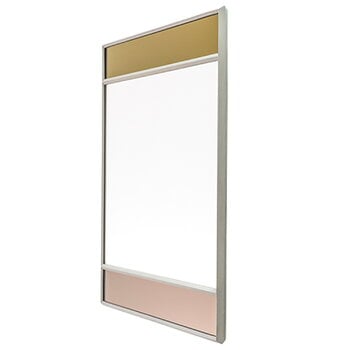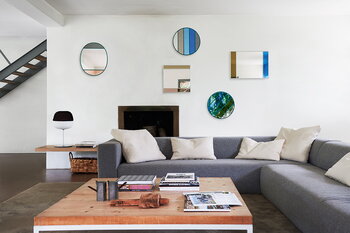The Vitrail mirror by Magis plays with colors and reflections. Designed by Inga Sempé, Vitrail is a collection of mirrors made up of colorful segments held together by a gray or green frame. The fun mirrors can be placed in the hallway or above the washbasin in the bathroom, but also on any wall of the house as decoration.
Vitrail mirror, 50 x 50 cm, light grey
Magis
Description
The Vitrail mirror by Magis plays with colors and reflections. Designed by Inga Sempé, Vitrail is a collection of mirrors made up of colorful segments held together by a gray or green frame. The fun mirrors can be placed in the hallway or above the washbasin in the bathroom, but also on any wall of the house as decoration.
Product details (5)
- Material
- Rubber, glass
- Colour
- Light gray
- Length
- 19.69 in (50 cm)
- Width
- 19.69 in (50 cm)
- Depth
- 0.63 in (1.6 cm)
Designer
Inga Sempé (b. 1968) is a French designer who graduated from ENSCI-Les Ateliers (French National Institute for Advanced Studies in Industrial Design, Paris) in 1993. She has designed furniture, lighting, objects and fabrics for companies such as Cappellini, Luceplan, Ligne Roset, Alessi, Svensk Tenn, Wästberg, Hay and Magis. Sempé's designs have been exhibited extensively across the world, and she has won several international design awards including the Grand Prix de la Création de la ville de Paris, a design prize awarded by the City of Paris, in 2003 and the Red Dot Design Award in 2007.
View all productsReviews (0)
Sustainability
The Product Sustainability Framework, our criteria of sustainable design, helps you find the most sustainable products in our selection. Read below which sustainability criteria this product has met.
Working conditions & labour 9/9
-
Equal opportunities for all employees
-
Commitment to UN Global Compact, fair compensation for all employees
-
Corporate responsibility requirements defined and communicated for suppliers
-
Systematic work for improved inclusion and well-being in the workplace
-
Transparent supply chain
-
Suppliers' compliance to a code of conduct ensured
-
Direct suppliers audited and certified
-
Compliance to the UN Guiding Principles on Business and Human Rights ensured in the supply chain
-
Support for community involvement in the supply chain
Eco-friendly production 7/9
-
Fair and resource-wise water-use in production
-
No incineration or landfilling of returned items
-
No use of endangered species as materials
-
No direct environmental emissions or waste (excl. GHGs) from production
-
Material-efficient and ecological packaging
-
Positive impact on nature’s well-being through operations that regenerate natural ecosystems
-
No potentially harmful chemicals used in own production
-
The sustainability of direct suppliers' production is addressed and monitored
-
Production and material sourcing that respect biodiversity, animal rights, and natural ecosystems
Climate impact 5/8
-
Company's direct greenhouse gas emissions identified and commitment to reduction
-
Product's carbon impact identified and commitment to reduction
-
Guidance on energy- and eco-efficient use of the product
-
Contribution to climate initiatives beyond the brand’s direct operations
-
100 % renewable energy in own production and operations
-
Low-carbon or compensated transportation
-
Carbon footprint of the product calculated and goals set to reduce it
-
Carbon neutral or carbon negative product
Sustainable materials 6/6
-
Sustainable and long-lasting material choices
-
No harmful or hazardous substances
-
Responsible raw material sourcing and production
-
Materials suited for circularity: monomaterials, recyclable finishings, renewable or recycled contents etc.
-
Ecological materials: natural, biodegradable, recyclable or recycled contents
-
Outstanding materials in terms of innovativeness, responsibility, sustainability and circularity: local production or sourcing, 100 % recycled content, C2C-certification etc.
Circular design 4/5
-
High aesthetic quality promoting long-term use of the product
-
Technically durable product design and material choices
-
Design for enduring life-long quality
-
Design and support for product maintenance, repair and upgradability
-
Innovative circular design solutions: circular service system, resale platform, remanufacturing, collection of used products, etc.
Chat to us online
Please enable functional cookies to use this feature. You can change your cookie settings at any time.





